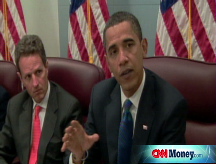Obama: $1 trillion deficits 'for years'
An expensive economic recovery plan will add to the short-term federal shortfall. But experts warn the bigger problem by far is the long-term picture.
NEW YORK (CNNMoney.com) -- President-elect Barack Obama is inheriting the worst economy in decades and says he'll need to "invest an extraordinary amount of money" to get it back on track.
Indeed, Obama's first act in office will be to push through what is expected to be an $800 billion economic recovery plan.
The stimulus package, combined with the $7.2 trillion the government has invested or loaned in the past year to combat the financial crisis, will add greatly to the federal budget deficit.
"At the current course and speed, a trillion-dollar deficit will be here before we even start the next budget," Obama said Tuesday. "And potentially we've got trillion-dollar deficits for years to come, even with the economic recovery that we are working on at this point."
On Wednesday, the Congressional Budget Office will release its 2009 budget and economic outlook, which will tell the deficit tale in black and white. A report from the Treasury Department last month found that the deficit in just the first two months of the current fiscal year exceeded $400 billion -- almost as high as it had been for all of fiscal year 2008.
But Obama promises that his administration will also embrace budget reform and put a choke collar on the country's record annual shortfall, if not in the immediate term, then soon after.
On Tuesday, he vowed to "bring a long-overdue sense of responsibility and accountability to Washington."
For now, many economists, even some noted deficit hawks who warn about the danger of Uncle Sam's long-term financial shape, say the severity of the economic downturn justifies borrowing more money in order to spend big in the short run and pave the way for long-term growth.
"Such steps -- even if deficits exceed $1 trillion this year and next -- are necessary to help avert a deep and prolonged recession," according to a recent report by the Center on Budget and Policy Priorities.
While no deficit hawk is happy about incurring annual trillion-dollar shortfalls, they are much more concerned about longer-term debts that dwarf them.
Not that $7.2 trillion to stem a financial crisis and another $800 billion to revive the economy isn't staggering. But it's also not money necessarily spent and gone, said Jim Horney, CBPP's federal fiscal policy director. Some portion of the $7.2 trillion is likely to come back to federal coffers over the next several years.
Further, an economy that falls into a prolonged recession can add to the deficit as well because of reduced tax revenue and increased government spending.
"As big as the deficits are, they have little effect on the long-run," Horney said.
Here's an example he offers: Excluding the costs from the federal bailouts and stimulus, the country's long-term fiscal gap -- the amount of spending cuts or tax increases needed to stabilize debt at today's level over the next 40 years -- is 4% of projected gross domestic product, according to CBPP estimates.
Add in the costs of those bailouts and stimulus and the gap rises only slightly to 4.2%.
To keep that gap from growing, any stimulus passed should be "timely, targeted and temporary," said David Walker, president and CEO of the Pete G. Peterson Foundation, a deficit watchdog group.
Obama and Congress should avoid permanent economic recovery measures that increase the country's long-term spending obligations or reduce its long-term revenue, Walker said.
Walker says there may be a silver lining to having a record annual deficit this year and next.
"It's a problem and it's an opportunity to learn lessons from recent failures and to put a process in place to avoid a much bigger problem," Walker said.
Horney and Walker both say the United States is on an unsustainable fiscal course in large part because of the rising cost of health care, which in turn pushes up the cost of providing Medicare and Medicaid.
Obama has promised that former CBO Director Peter Orszag, whom Obama has tapped to head the White House Office of Management and Budget, will go through the federal budget line by line and recommend areas where cuts can be made.
And, Obama said, "I'm going to be willing to make some very difficult choices to get a handle on this deficit."
But no matter how intrepid Orszag may be in making suggestions or how willing Obama is to play the heavy, they will only be able to trim so much without striking at the heart of the beast threatening to consume more and more of the country's financial resources.
Barring any changes to federal law, the CBO estimates that total spending on health care will rise from 16% of GDP to 25% in 2025 and 50% in 2082.
When it comes to curbing the long-term federal deficit, Horney said, "The big enchilada is bringing health care under control." ![]()




